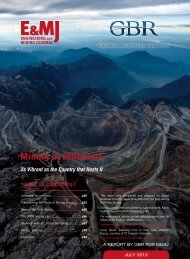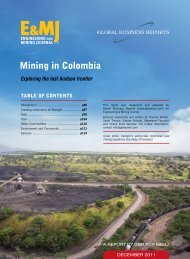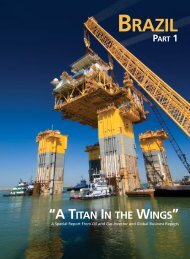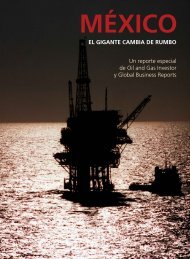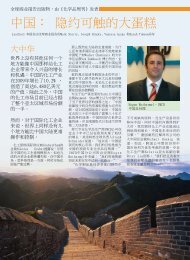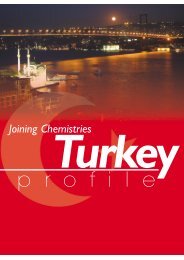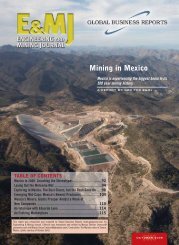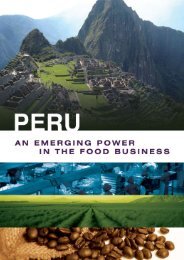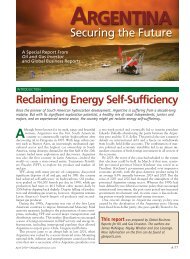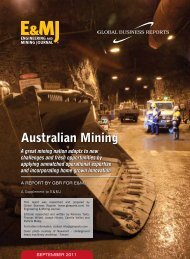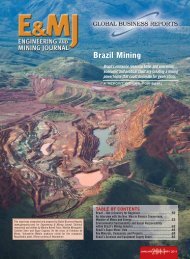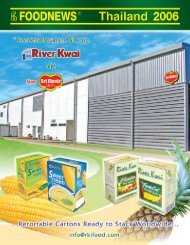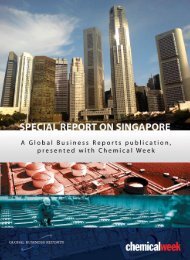Turkey Speciality Chemicals 2006 - GBR
Turkey Speciality Chemicals 2006 - GBR
Turkey Speciality Chemicals 2006 - GBR
Create successful ePaper yourself
Turn your PDF publications into a flip-book with our unique Google optimized e-Paper software.
<strong>Turkey</strong> special report<br />
Synthesis & decomposition in th<br />
Along with its position at the crossroads of Europe, Asia<br />
and the Middle East, <strong>Turkey</strong> continues to attract attention<br />
and interest for its complex mix of modern industry<br />
and commerce. With a young and growing population of<br />
nearly 70 million and a booming industrial sector, <strong>Turkey</strong><br />
seems like a gold mine waiting to be tapped.<br />
As EU accession talks began in October 2005, <strong>Turkey</strong> has<br />
moved closer to the old continent and will be able to count on<br />
increased foreign investment to bolster and expand its industries,<br />
from chemicals to high technology and energy. The hope<br />
of EU membership has indirectly worked as a catalyst for the<br />
whole economy and especially the chemicals sector.<br />
<strong>Turkey</strong> has enjoyed a strong recovery from the severe economic<br />
contraction it experienced due to a devastating financial<br />
and currency crisis in November 2000 and February 2001.<br />
During 2004, real GDP grew by a healthy 8.9%, though with an<br />
inflation rate of 9.3%. In 2005, real GDP growth was at 5%, with<br />
inflation at 7.5%. Unemployment was around 9.3% in 2005.<br />
The IMF began working closely with <strong>Turkey</strong> following the<br />
2001 economic crisis. In early 2002, the two parties jointly<br />
agreed to a €15.7 billion standby assistance package. On 11<br />
May, 2005, they agreed to a further €8.4 billion, three-year<br />
package. The condition is the implementation of a variety of<br />
measures to address the root causes of the country’s economic<br />
problems.<br />
Consequently, <strong>Turkey</strong> has pledged to cut state spending and<br />
subsidies, reform the banking sector, accelerate the privatisation<br />
of state-owned industries, lower the inflation rate, reduce its<br />
heavy debt burden, and in general, create “a stable macroeconomic<br />
environment conducive to economic growth”.<br />
In May 2005, the IMF stated that “<strong>Turkey</strong>’s economic performance<br />
is the strongest for a generation” and called for measures<br />
ranging from the continued independence of the central<br />
bank to full inflation targeting in order to facilitate further reductions<br />
in interest rates and generate sustained growth.<br />
Despite the positive signs seen recently, <strong>Turkey</strong> continues to<br />
face numerous economic challenges, including: a large ‘grey’<br />
economy; sharp income inequalities; a large and inefficient state<br />
sector; overly complicated legal and administrative procedures;<br />
a relatively inhospitable foreign investment climate; and, a<br />
stalled privatisation programme. Hence, careful planning and<br />
patience are the keys to success in <strong>Turkey</strong>.<br />
18,000<br />
16,000<br />
14,000<br />
12,000<br />
10,000<br />
8,000<br />
6,000<br />
4,000<br />
2,000<br />
0<br />
EU-15<br />
9,741<br />
1,463 1,545<br />
10,391<br />
Western Europe<br />
2,547<br />
Others<br />
6,108<br />
2004 Total Exports 2004 Total Imports<br />
Figure 1 - Foreign chemical<br />
trade of <strong>Turkey</strong>, 2004<br />
4,092<br />
Total<br />
16,499<br />
<strong>Turkey</strong>’s move toward EU membership offers an excellent<br />
opportunity to adopt European business regulations and standards,<br />
ultimately making it easier to conduct business here.<br />
Because it is the commercial hub of Central Asia, <strong>Turkey</strong>’s<br />
resources can eventually be used to expand business opportunities<br />
throughout Central Asia, the Middle East and the<br />
Caucasus.<br />
The value-added Turkish chemicals industry is one of those<br />
that have been able to raise their standards and it can count on<br />
some steady foreign investment. The industry is fundamental to<br />
<strong>Turkey</strong>’s overall industrial development and has been able to<br />
work on its comparative advantages as well as define its goals<br />
for the future.<br />
Certain natural attributes and new prospects have structured<br />
the chemicals industry into the form it takes today. <strong>Turkey</strong>’s natural<br />
reserves of soda ash, chrome and boron have helped to create<br />
advantages by supplying valuable raw materials. The speciality<br />
pharmaceuticals, paints and coatings industries have also<br />
performed well in terms of production capacity and exports.<br />
However, the industry still depends heavily on imports for<br />
both raw materials and more advanced technological requirements,<br />
with its import/consumption ratio steadily increasing,<br />
from 40% in 1990 to 55.5% in 2003. Niche product specialisation<br />
and foreign investment have become the ultimate solutions<br />
to <strong>Turkey</strong>’s chemical dilemma.<br />
Both Mustafa Bagan, secretary general of the Turkish<br />
Chemical Manufacturers Association (TCMA), and Turgut<br />
Doyran, chairman of the board of the Istanbul <strong>Chemicals</strong> &<br />
Chemical Products Exporters’ Association stress that foreign<br />
investment is essential for the next stage of development of the<br />
speciality chemicals industry.<br />
Large-scale chemical production in <strong>Turkey</strong> began in the<br />
1960s as the government adopted import substitution policies<br />
that directed public sector investments in the areas of petrochemicals,<br />
fertilisers and basic organic and inorganic chemicals.<br />
These capital-intensive investments, however, did not yield<br />
high profitability. With the liberalisation of the economy in the<br />
1980s, the private sector and foreign investors mushroomed,<br />
predominantly in the production of pharmaceuticals, specialised<br />
textile chemicals and cleaning materials.<br />
The Turkish chemicals industry in recent years has been<br />
characterised by import dependency, technological improvement<br />
and sporadic foreign investment. Approximately half of<br />
<strong>Turkey</strong>’s overall chemicals demand is met by imports.<br />
This ratio rises to over two-thirds in base chemicals and<br />
organic chemicals, and even higher in some categories. Many<br />
varieties of base chemicals are 100% imported (as are 90% of<br />
dyestuffs and pigments), although they then go through a<br />
process of specialisation and value-addition.<br />
Certain products are largely produced locally, usually<br />
because of easy access to certain raw materials. Since sodium<br />
and boron products and their intermediates are locally produced<br />
items, import levels are as low as 36%. Therefore boron<br />
and sodium derivatives and speciality paints and coatings have<br />
export potential.<br />
Despite high import requirements, chemicals still constitute<br />
one of <strong>Turkey</strong>’s major export items. The sector is becoming<br />
more import-dependent as the economy develops, since production<br />
falls short of domestic demand and new investments<br />
are small in scale, often being directed at expanding existing<br />
production lines.<br />
56 January/February <strong>2006</strong> <strong>Speciality</strong> <strong>Chemicals</strong> Magazine<br />
www.specchemonline.com



